- Home
- Margaret Atwood
Hag-Seed Page 7
Hag-Seed Read online
Page 7
It's theatre, Felix protests now, in his head. The art of true illusions! Of course it deals in traumatic situations! It conjures up demons in order to exorcise them! Haven't you read the Greeks? Does the word catharsis mean anything to you?
Mr. Duke, Mr. Duke. You are being far too abstract. These are real people. They are not ciphers in your aesthetic of drama, they are not your experimental mice, they are not your playthings. Have some respect.
I do have respect, Felix answers silently. I have respect for talent: the talent that would otherwise lie hidden, and that has the power to call forth light and being from darkness and chaos. For this talent I clear a time and a space; I allow it to have a local habitation and a name, ephemeral though these may be; but then, all theatre is ephemeral. That is the only kind of respect I recognize.
Brave sentiments, he tells himself. But high-falutin', Mr. Duke, wouldn't you say?
--
He pauses at a closed door blocking his way, waits until it slides open, walks through. It glides shut behind him. There's a similar door at the other end of this segment of the building. Both of these doors are kept closed and locked while his classes are in session. Safer that way, Mr. Duke.
There's no audio link with Security outside, there's no video. He has insisted on that: actors should not be spied on while they are rehearsing, it's too inhibiting. The pager on his belt should be enough, is his position, and so far he's been vindicated. In three years, he's never had an occasion to use it.
There's a washroom in here, first door on the left. There are three smaller rooms that he can use as rehearsal space or dressing rooms or green rooms, according to need. There are two demonstration cells, a replica of a cell from the fifties and another one from the nineties, once used in conjunction with a Justice Administration course taught at the University of Western Ontario but uninhabited since. Each has four bunks, two upper, two lower, and an observation window in the door.
The Fletcher Correctional Players utilize them for sets during their video filmings. They've been army tents, for Brutus and Richard and their nightmares. With the aid of red blankets and paper banners, they've been throne rooms. They've been the Scottish witches' cave, they've been the Roman Senate, they've been a dungeon in the Tower, where First and Second Murderer have skulked, preparing to drown Clarence in booze. Lady Macduff and her children have been slaughtered in them. That was almost too traumatic: some of the actors had had flashbacks to their nightmare childhoods. Violent brutes, threats, bruises, screams, knives.
Felix peers through the windows of these cells on his way past. All is dingy within, although tidy, the bunks neatly made up with gray blankets. Who'd ever suspect the sorcery, the ceremony, the mayhem that has taken place in there? And what will happen in them next?
Finally there's the largest classroom, the one Felix uses for the more expositional segments of his course, prior to rehearsals. It has twenty desks; it has a whiteboard; it also, thanks to Estelle, has a computer--unconnected to the outside Internet, so no porn-site surfing is possible; it is to be used for theatre work only. Most importantly, the room has a large flatscreen. It's on this screen that the actors are able to watch the results of their endeavors.
This room has two doors, one at the front and one at the back. It has no windows. It smells faintly of salt, and of unwashed feet.
This is the extent of it, Felix muses. My island domain. My place of exile. My penance.
My theatre.
Felix stands beside the whiteboard at the front of the large main room, facing this year's class. Although he's read the signup list and sent out the course packages--the playbook, the notes--he never knows ahead of time who will actually show up. There are always some dropouts, and thus some replacements from the waiting list. To his credit there's always a waiting list. There can be absences for other reasons too. Transfers to other facilities, early paroles, injuries requiring infirmary time.
He scans the room. Familiar faces, veterans of his previous plays: these nod at him, offer half-smiles. New faces, blank or apprehensive: they don't know what to expect. Lost boys all of them, though they are not boys: their ages range from nineteen to forty-five. They are many hues, from white to black through yellow, red, and brown; they are many ethnicities. The crimes for which they've been convicted are assorted. The one thing they share, apart from their imprisoned state, is a desire to be in Felix's acting troupe. Their motives, he expects, are varied.
He's read their files, obtained for him by Estelle through some mysterious process, although he pretends he hasn't; so he knows what they're in here for. Some are gang members taking the rap for a higher-up, some have been busted for semi-amateur drug-dealing. Theft, from banks to break-and-enters to cars to convenience stores. A boy-genius hacker, convicted as a for-hire purloiner of corporate information. A con man and identity-theft specialist. A renegade doctor. An accountant from a respectable firm, doing time for embezzlement. A lawyer and Ponzi scheme scammer.
Some of them are seasoned actors, having been in several of his plays. Technically they shouldn't be able to take the course more than once, but Felix has sidestepped this stricture by adding a few spinoffs to his main offering, with how-tos and plug-ins downloaded from the Net. In "Technology for the Theatre," they learn lighting, props, special effects, and digital scenery. In "Theatre Design," they learn costume, makeup, wigs, and masks. In "Video Editing for the Theatre," they learn how to make silk purses out of sows' ears. He doles out academic credits accordingly. It all looks good on paper to the powers that be. Mr. Duke is such a bargain: four courses for the price of one.
Meanwhile he's nurtured a number of skill sets he can call upon when needed. He's got costume designers, he's got video editors, he's got lighting and special-effects men, he's got tip-top disguise artists. He does sometimes wonder how the crafts he's teaching might come in handy in, for instance, a bank robbery or a kidnapping, but he backgrounds such unworthy thoughts when they appear.
He gazes around the room, already casting the roles in his head. There's his perfect Ferdinand, Prince of Naples, gazing at him with round, ingenuous eyes as if ready to fall in love: WonderBoy, the con artist. There's his Ariel, unless he's much mistaken, elemental air spirit, slender and adroit, scintillating with cool juvenile intelligence: 8Handz, genius black-hat hacker. A podgy Gonzalo, the boring, worthy councillor: Bent Pencil, the warped accountant. And Antonio, the magician Prospero's treacherous, usurping brother: SnakeEye, the Ponzi schemer and real-estate fraudster, with his slanted left eye and lopsided mouth that make him look as if he's sneering.
A moon-calf Trinculo, the fool, the jester. No obvious Stephano, the drunken butler. Various Calibans, scowling and muscular: earthy, potentially violent. He'll have a choice. But before making up his mind about any of them he'll have to hear them speak some lines.
He smiles confidently, the smile of someone who knows what he's doing. Then he launches into a version of the speech with which he begins every new season.
"Good morning," he says. "Welcome to the Fletcher Correctional Players. I don't care why you're in here or what they say you've done: for this course the past is prologue, which means we begin counting time and accomplishments right here, right now.
"As of this moment, you are actors. You will all be acting in a play; everyone will have a function, as the old hands who've done it before will tell you. The Fletcher Correctional Players only do plays by Shakespeare, because that is the best and most complete way of learning theatre. Shakespeare has something for everyone, because that's who his audience was: everyone, from high to low and back again.
"My name is Mr. Duke, and I'm the director. That means I'm in charge of the overall production, and the final say is mine.
"But we work as a team. Each man will have an essential part to perform, and if someone's having trouble it's the job of his teammates to help him out, because our play will be only as strong as the weakest link: if one of us fails, we all fail together. So if a guy on your team
has trouble reading the words, you need to help him. And you need to help each other memorize the parts, and understand what the words mean and how to deliver them with force. That's your mission. We must all rise to the highest level. The Fletcher Correctional Players have a reputation to live up to, and what we create together will honor that reputation.
"You've heard me mention teams, and those of you who've been in one of my plays before know what that means. Each of the principal characters will have a team surrounding him, and everyone on that team must learn that character's speeches. That's because each main actor must have some understudies, in case of illness or any other...in case of unforeseen emergencies, such as early parole, for instance. Or a slip in the shower room. The play must go on despite everything: that's how it is in the theatre. In this company, we back each other up.
"You'll be doing some writing. You'll be writing about aspects of the play, but you'll also be rewriting those parts of the play you decide--we decide--could be made more understandable to a modern audience. We'll be filming a video of our production; that video gets screened for everyone in the--for everyone in Fletcher. Our video will be something to be proud of, as our previous productions have been."
He smiles reassuringly, consults a folder. "Next, you'll need to choose a stage name. Many actors in the past did that, and opera singers and magicians as well. Harry Houdini was born Erik Weisz, Bob Dylan was Robert Zimmerman, Stevie Wonder was Steveland Judkins." He's looked these names up on the Internet, searching stage alter egos. He knows only some of them: he adds a few younger ones each time he gives this speech. "Movie stars do it, not to mention rockers and rappers. Snoop Dog was Calvin Broadus. You see what I mean? So think up your stage name. It's like a handle."
There are nods and murmurs. The seasoned actors already have their stage names from earlier productions. They're smiling now: they welcome the return of this other self of theirs, standing there like a costume, ready for them to assume.
Felix pauses, steels himself for the hard sell. "Now. This year's play." He writes on the whiteboard, using a red marker: THE TEMPEST. "So," he says. "You've been given the playbook in advance, you've got my notes, you've had time to read up on it." For a few of them this is true only in a manner of speaking, since they're third-grade level at best. They'll improve, however: their team will improve them. They'll be hauled up the stairs of literacy step by step.
"I'll start with the keynotes," Felix continues. "These are the important things to look for when we're figuring out how to present this play."
Using the blue marker, he writes:
IT'S A MUSICAL: Has the most music + songs in Shkspr. Music used for what?
MAGIC: Used for what?
PRISONS: How many?
MONSTERS: Who is one?
REVENGE: Who wants it? Why?
Consulting their faces--stony, frowning, or blankly bewildered--he thinks: they don't get it. Not like Julius Caesar, not like Macbeth; they saw the point of those right away. Not even like Richard III, which had posed a challenge, since a few too many of them had sided with Richard.
He takes a deep breath. "Off the top, any questions?"
"Yeah," says Leggs. Break-and-enter, assault. He's a veteran of the Fletcher Correctional stage, having played Mark Antony in Julius Caesar, one of the witches in Macbeth, and Clarence in Richard III. "We read it. But why're we doing this one? There's no fight scene, and it's got, like, a fairy in it."
"I'm not being a fairy," says PPod. He'd been Lady Macbeth in Macbeth and Richmond in Richard III. He's a sweet-talker, with--according to him--a bevy of devoted beauties waiting for him once he gets out.
"Not being a girl, either." That from Shiv: he has a Somali drug-gang connection and was caught in a big bust a few years back. He looks around the room for support: truculent nods, murmurings of agreement. No one wants either of these parts: not the Ariel, not the Miranda.
Felix has a potential rebellion on his hands, but he's anticipated it. He's faced the gender issue in the other plays, but those female characters had been grown women and either ciphers or downright nasty, and thus much easier to accept. The witches in Macbeth had been a pushover--the guys had no objection to playing evil crones because they were monsters, not actual women--and Calpurnia was minor. Lady Macbeth was even more of a monster than the witches: PPod said she was just like his mother, and had enacted her to great effect. Lady Anne in Richard III was angry and a spitfire; in fact, she was a spitter. Shiv had made a meal of it.
Miranda, however, is not a monster or a grown woman. She's a girl, and a vulnerable girl. Any man playing her would lose status in a disastrous way. He'd become a butt, a target. Playing a girl, he'd risk being treated as one. It would be ruinous for the Ferdinand as well: having to pitch those swooning love speeches to a surly fellow inmate.
"Let's get the girl thing out of the way right now," says Felix. "First, nobody in this room will have to be Miranda. Miranda is a sweet, innocent fifteen-year-old. I can't see any of you being very convincing with that."
The grunts of relief are audible. "Okay, good," says Shiv. "But if nobody here's doing it, then who is?"
"I shall engage..." Felix pauses, rearranges his language. "I'm hiring a professional actress," he says. "An actual woman," he adds so they truly grasp the point.
"She's coming in here?" says PPod. "To be in our play?" They look at one another, incredulous. Already The Tempest is more appealing to some of them.
"You can get some chick to do that?"
WonderBoy, the soulful-eyed con man, speaks up. "I don't think it's right that you'd bring a young girl in here. You're putting her in a weird position. Not that I'd lay a finger myself," he says. "But. Just sayin'."
"Yeah, you fuckin' A would," says a voice from the back. Laughter.
"She'll be acting the part of a young girl," says Felix. "I didn't say she would be a young girl. Not that she'll be old," he adds to counter the expressions of dismay. "Consider her participation a privilege. Any trouble--pestering, groping, pinching, dirty talk, and so forth--and she's gone, and so are you. I expect you all to behave like the professional actors I consider you to be." Not that professional actors fail to indulge in the pinching and groping, he reminds himself. But no need to share that reflection.
"Some lucky stiff's gonna be playing Ferdie what's-his-name," says Leggs. "Gets those hot closeup scenes."
"Stiff is right," says PPod.
"Guy's gonna be so stiff he'll be frozen." Murmuring, chuckling.
"We'll deal with that when we come to it," says Felix.
"That's all very well," says Bent Pencil, the embezzling accountant. His stage name has been conferred upon him by common consent. He wasn't too pleased about it at first, he tried to insist on something more dignified, such as "Numbers." He wanted to preserve his feeling of superiority. But he's come to accept "Bent Pencil," because what choice does he have?
Bent Pencil played Cassius in Julius Caesar and is a stickler on details, often tediously so. Felix finds him a trial. He always wants to show how well prepared he is. Gonzalo, he thinks: Bent Pencil is excellent for it.
"That's all very well," Bent Pencil goes on, "but you haven't addressed the issue of the, uh...the Ariel issue."
"Yeah, the fairy," says Leggs.
"We'll discuss that on Friday," says Felix. "Now, your first written exercise. I want you to go through the text very carefully and make a list of all the curse words in the play. Those are the only curse words we'll be using in this room. Anyone caught using those other words, the F-bomb and so on, loses a point off their total. Counting of points is by the honor system, but we are one another's witnesses. Understood?"
Grins from the veterans: Felix always sets the class a challenge like this.
"We playing for cigarettes?" asks PPod. "As usual?"
"Of course," says Felix. "Once you have your list, pick ten of those curse words and memorize them, and then learn how to spell them. Those will be your special swear words. You can a
pply them in this class to anyone and anything. If you don't know what they mean I'll be happy to tell you. Ready, steady, go!"
Heads are bent, notebooks are opened, playbooks are consulted, pencils busy themselves.
Your profanity, thinks Felix, has oft been your whoreson hag-born progenitor of literacy. Along with your whoreson cigarettes, may the red plague rid them.
On the Wednesday, Felix is feeling more relaxed. He's over the first hurdle. He puts on his most avuncular face: indulgent but hoping for excellence. "Let's see how you made out with your curse words," he says. "Who's got the consolidated list?"
"Bent Pencil," says Shiv.
"And who's going to read it so we can all hear it?"
"Him," says Leggs.
" 'Cause he can pronounce them," says PPod.
Bent Pencil takes the floor and reads out, gravely and impressively, in his best board-meeting voice: "Born to be hanged. A pox o'your throat. Bawling, blasphemous, incharitable dog. Whoreson. Insolent noisemaker. Wide-chapp'd rascal. Malignant thing. Blue-eyed hag. Freckled whelp hag-born. Thou earth. Thou tortoise. Thou poisonous slave, got by the devil himself. As wicked dew as e'er my mother brushed, With raven's feather from unwholesome fen, Drop on you both. A south-west blow on ye, And blister you all o'er. Toads, beetles, bats light on you. Filth as thou art. Abhorr'ed slave. The red plague rid you. Hag-seed. All the infections that the sun sucks up, From bogs, fens, flats, fall on--add name here--and make him, By inch-meal a disease. Most scurvy monster. Most perfidious and drunken monster. Moon-calf. Pied ninny. Scurvy patch. A murrain on you. The devil take your fingers. The dropsy drown this fool. Demi-devil. Thing of darkness."
"Well done," says Felix. "That sounds fairly complete. I can't think of anything you've missed. Any questions or comments?"
"I been called worse," says PPod.
"Why is earth such an insult?" says Leggs.
"Yeah, we live on the earth," says Red Coyote. "It grows food, right? And tortoise. That's like a turtle, right? It's a sacred thing for some nations. Why is it bad, a turtle?"

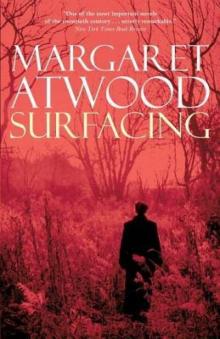 Surfacing
Surfacing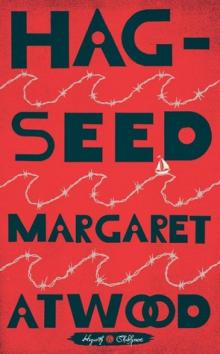 Hag-Seed
Hag-Seed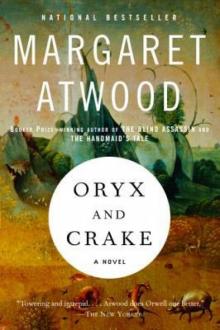 Oryx and Crake
Oryx and Crake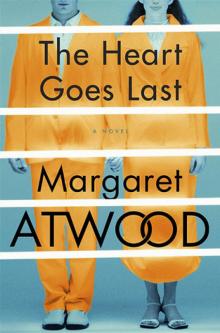 The Heart Goes Last
The Heart Goes Last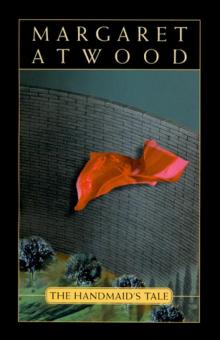 The Handmaid's Tale
The Handmaid's Tale Lady Oracle
Lady Oracle Good Bones and Simple Murders
Good Bones and Simple Murders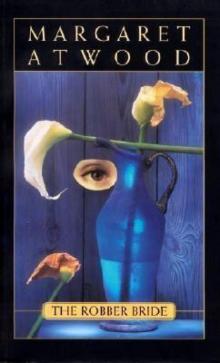 The Robber Bride
The Robber Bride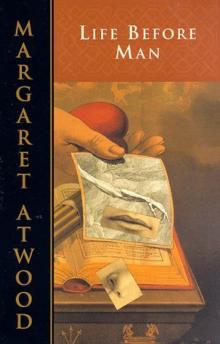 Life Before Man
Life Before Man Alias Grace
Alias Grace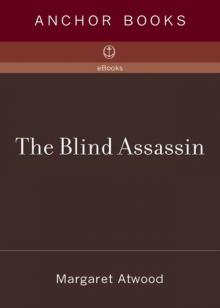 The Blind Assassin
The Blind Assassin Cat's Eye
Cat's Eye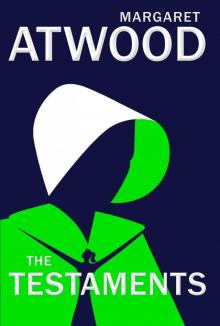 The Testaments
The Testaments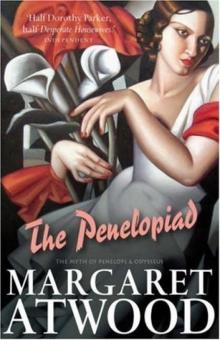 The Penelopiad
The Penelopiad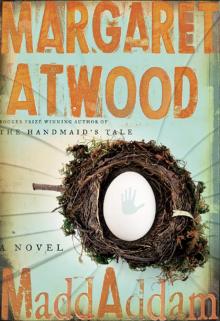 MaddAddam
MaddAddam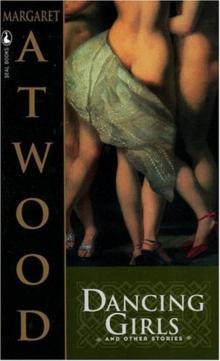 Dancing Girls & Other Stories
Dancing Girls & Other Stories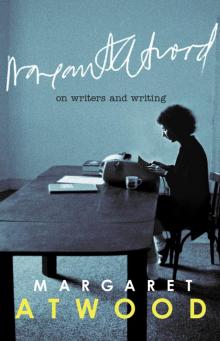 On Writers and Writing
On Writers and Writing Selected Poems II (1976-1986)
Selected Poems II (1976-1986) Wilderness Tips
Wilderness Tips Dearly
Dearly The Tent
The Tent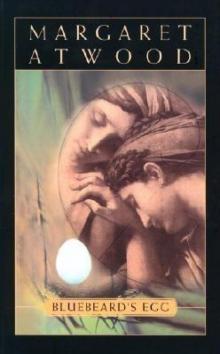 Bluebeard's Egg
Bluebeard's Egg The Edible Woman
The Edible Woman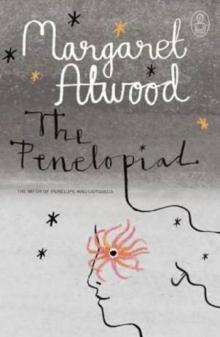 The Penelopiad: The Myth of Penelope and Odysseus
The Penelopiad: The Myth of Penelope and Odysseus Good Bones
Good Bones I Dream of Zenia with the Bright Red Teeth
I Dream of Zenia with the Bright Red Teeth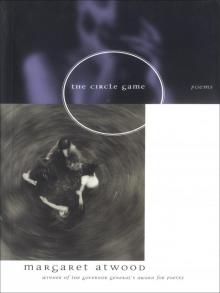 Circle Game
Circle Game Choke Collar: Positron, Episode Two
Choke Collar: Positron, Episode Two Stone Mattress: Nine Tales
Stone Mattress: Nine Tales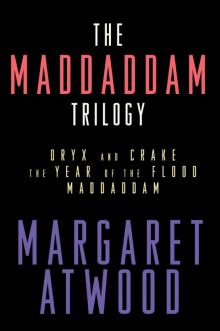 The MaddAddam Trilogy
The MaddAddam Trilogy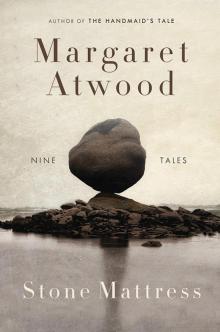 Stone Mattress
Stone Mattress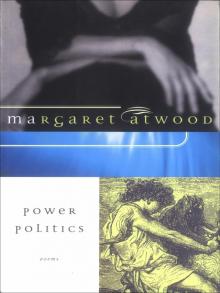 Power Politics
Power Politics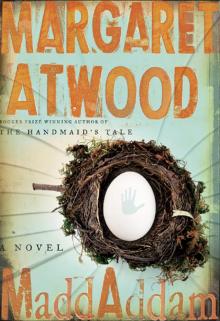 MaddAddam 03 - MaddAddam
MaddAddam 03 - MaddAddam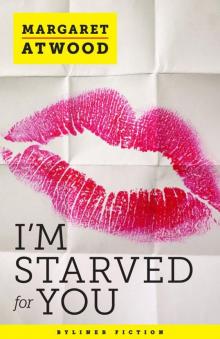 I’m Starved for You (Kindle Single)
I’m Starved for You (Kindle Single) Murder in the Dark
Murder in the Dark In Other Worlds
In Other Worlds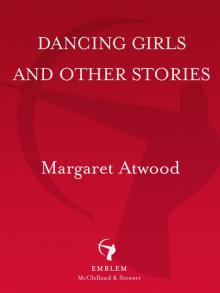 Dancing Girls
Dancing Girls Moral Disorder
Moral Disorder